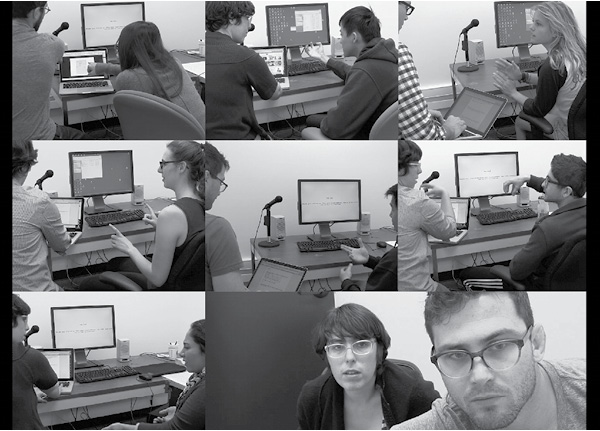
EXPF: SHAPING EXPERIMENT
first performed on May 6, 2015
a cognitive science research laboratory, San Diego, CA
ongoing for one month in spring 2015
SARAH KLEIN / TYLER MARGHETIS
San Diego, CA / Los Angeles, CA; Bloomington, IN
425109978s425109978a425109978r425109978a425109978h425109978a425109978n425109978k425109978l425109978e425109978i425109978n425109978@425109978g425109978m425109978a425109978i425109978l425109978.425109978c425109978o425109978m425109978 425109978/425109978 425109978t425109978y425109978l425109978e425109978r425109978.425109978m425109978a425109978r425109978g425109978h425109978e425109978t425109978i425109978s425109978@425109978g425109978m425109978a425109978i425109978l425109978.425109978c425109978o425109978m
EXPF: SHAPING EXPERIMENT
SARAH KLEIN / TYLER MARGHETIS
EXPF materializes concerns about the reproduction of institutional and epistemic power within scientific activity. This performance, a collaboration between a cognitive scientist and an ethnographer of cognitive science, interrogates the power relationships between scientists, subjects, and the experiments in which they are unequal performers. Scientific experiments require the ongoing enrollment of participants, who are regimented in subtle ways to perform both as data sources and as ideal subjects. We take as our material the invisible routines—disciplinary, infrastructural, embodied—that stage this enrollment at the microscale of laboratory interaction. By inverting the agential structure of the experiment, unmooring it from scientific hypothesis, this reflexive regimentation becomes perceptible and actionable. What emerges in the activity of the experiment when, instead of intervening on submissive subjects, the experiment becomes malleable and responsive, conforming to subjects’ impressions of and aspirations for science?
EXPF rearranged materials and practices that are local to the cognitive psychology lab. We recruited subjects using a university’s system for tracking experiment volunteers. We brought them to the lab. They completed a consent form. We brought them into the testing room. They filled out a demographic questionnaire. We had them complete what appeared to be a standard computer-based cognitive psychology experiment. After the “experiment,” we elicited their reflections on the experiment’s purpose and design, culminating in suggestions for how to improve all aspects: questionnaire, instructions, task, stimuli, physical space, and “experimenters.” Our performance score required that we respond to and resolve subjects’ feedback before the next subject arrived, whose impressions revised the experiment for the next subject, and so on, creating an iterated chain of performance and revision. Over the course of the performance, subjects’ feedback required that we modify the experimental task, add images, insert pop music, change the timing, edit the instructions, rearrange the testing room, and begin to wear labcoats to better resemble prototypical scientists. Subjects created experiences that conformed to their expectations of science, expectations that were shaped by the expectations of subjects who came before. The performance became a site of resistance to scientific authority, even while, paradoxically, subjects’ continued to behave as ideal, submissive subjects: because our performance included the convention of concealing the intentions of an experiment until the end, subjects were oblivious to their structural power until they no longer had it.